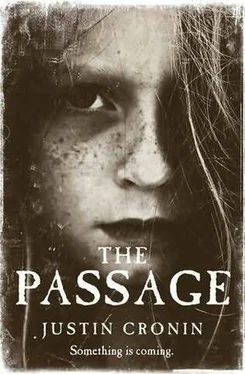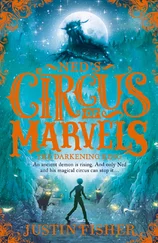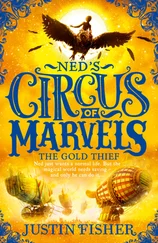As for the girl: he didn’t know.
They’d skirted the Oklahoma City limits to the northeast, dodging the Interstate 40 checkpoint and bisecting I-35 on an anonymous rural blacktop, far from any cameras. The Tahoe lacked a GPS, but Wolgast had one on his handheld. Guiding the steering wheel with one hand, nimbly thumbing away on the handheld’s tiny keys with the other, he let their route evolve as they went, a patchwork of county and state roads, some gravel or even just hard-packed dirt, to carry them gradually north and west. Now, all that lay between them and the Colorado border were a few small towns-towns with names like Virgil and Ricochet and Buckrack-half-abandoned oases in a sea of tallgrass prairie with little to show for themselves but a mini-mart, a couple of churches, a grain elevator and, between them, the miles of open plain. Flyover country: the word it made him think of was eternal . He guessed it looked much the same as it always had, the way it would go on looking just about forever. A man could disappear into a place like this without hardly trying, live his life without one soul to notice.
Maybe, Wolgast thought, when this was all over, he’d come back. He might need a place like that.
Amy was so quiet in the backseat it might have been possible to forget she was there at all, if not for the fact that everything about her being there was wrong. A six-year-old girl. Goddamn Sykes, Wolgast thought. Goddamn the Bureau, goddamn Doyle, and goddamn himself while he was at it. Lying across the wide backseat with her hair spilled over her cheek, Amy looked as if she were sleeping, but Wolgast didn’t think she was; she was pretending, watching him like a cat. Whatever had happened in her life so far, it had taught her how to wait. Whenever Wolgast had asked her if she needed to stop to use the bathroom or get something to eat-she hadn’t touched the crackers and milk, warm and spoiled by now-the lids of her eyes had lifted with a feline quickness at the sound of her name, meeting his gaze in the mirror for a single second that went through him like a three-foot icicle. Then she’d shut them again. He hadn’t heard her voice since the zoo, more than eight hours ago.
Lacey. That was the nun’s name. Who’d held on to Amy like death itself. When Wolgast thought about that awful human tug-of-war in the parking lot, everyone yelling and screaming, the memory twisted in his gut with an actual physical pain. Hey, Lila, guess what? I stole a kid today. So now we’ll each have one, how about that?
Doyle was rousing in the passenger seat. He sat up and rubbed his eyes, his expression blank and focusless. His mind, Wolgast knew, was reassembling his awareness of where he was. He looked back at Amy quickly, then turned to face forward again.
“Looks like some weather ahead,” he said.
The thunderheads had risen to a boil, blocking the sunset and sinking them into a premature darkness. At the horizon, beneath a shelf of clouds, a haze of rain was falling through a band of golden sunlight onto the fields.
Doyle leaned forward to examine the sky through the windshield. His voice was quiet. “How far away you think that is?”
“I guess about five miles.”
“Maybe we should get off the road.” Doyle checked his watch. “Or turn south for a while.”
Two miles later, they passed an unmarked dirt road, its edges lined with barbed-wire fencing. Wolgast stopped the car and backed up. The road crested a gentle rise and vanished into a line of cottonwoods; probably there was a river on the other side of the hill, or at least a gully. Wolgast checked the GPS; the road wasn’t on it.
“I don’t know,” Doyle said, when Wolgast showed him. “Maybe we should look for something else.”
Wolgast turned the wheel of the Tahoe and headed south. He didn’t think the road was a dead end; there would have been postal boxes at the intersection if it were. Three hundred yards later, the road narrowed to a single lane of rutted dirt. Beyond the tree line they crossed an old wooden bridge that spanned the creek Wolgast had foreseen. The evening light had gone a sallow green. He could see the storm rising above the horizon in his rearview mirror; he knew, from the blowing tips of the ditch grass on either side, that it was following them.
They had traveled another ten miles when the rain started to fall. They’d passed no houses or farms; they were in the middle of nowhere, with no cover. First just a few drops, but then, within seconds, a downpour of such force that Wolgast couldn’t see a thing. The wipers were useless. He pulled to the edge of the ditch as a huge gust of wind buffeted the car.
“What now, chief?” Doyle asked over the racket.
Wolgast looked at Amy, still pretending to sleep in the backseat. Thunder roiled overhead; she didn’t flinch. “Wait, I guess. I’m going to rest a minute.”
Wolgast closed his eyes, listening to the rain on the roof of the Tahoe. He let the sound wash through him. He’d learned to do this during those months with Eva, to rest without quite giving himself over to sleep, so that he could rise quickly and go to her crib if she awakened. Scattered memories began to gather in his mind, pictures and sensations from other times in his life: Lila in the kitchen of the house in Cherry Creek, on a morning not long after they’d bought the place, pouring milk into a bowl of cereal; the cold dousing of water as he dove from the pier in Coos Bay, the sounds of his friends’ voices above him, laughing and urging him on; the feeling of being very small himself, no more than a baby, and the noises and lights of the world around him, all of it letting him know he was safe. He had entered sleep’s antechamber, the place where dreams and memories mingled, telling their strange stories; yet part of him was still in the car, listening to the rain.
“I have to go.”
His eyes snapped open; the rain had stopped. How long had he slept? The car was dark; the sun had set. Doyle was twisted at the waist, turned to face the backseat.
“What did you say?” Doyle asked.
“I have to go,” the little girl stated. Her voice, after hours of silence, was startling: clear and forceful. “To the bathroom.”
Doyle looked at Wolgast nervously. “Want me to take her?” he said, though Wolgast knew he didn’t want to.
“Not you ,” Amy said. She was sitting up now, holding her rabbit. It was a floppy thing, filthy with wear. She eyed Wolgast in the mirror, lifted her hand and pointed. “Him.”
Wolgast undid his seat belt and stepped from the Tahoe. The air was cool and still; he could see, to the southeast, the last of the storm receding, leaving in its wake a dry sky the color of ink, a deep blue-black. He hit the key fob to unlock the passenger door and Amy climbed out. She had zipped the front of her sweatshirt and pulled the hood up over her head.
“Okay?” he asked.
“I’m not doing it here.”
Wolgast didn’t say anything about not wandering off; there seemed no point. Where would she go? He led her fifty feet down the roadway, away from the lights of the Tahoe. Wolgast looked away while she stood at the edge of the ditch and pulled down her jeans.
“I need help.”
Wolgast turned. She was facing him, her jeans and underpants bunched around her ankles. He felt his face warm with embarrassment.
“What do you need me to do?”
She held out both her hands. Her fingers felt tiny in his own; her palms were moist with childlike heat. He had to hold tightly as she leaned back, giving him nearly all her weight, to position herself in a crouch, suspending her body out over the ditch like a piano swinging from a crane. Where had she learned to do this? Who else had held her hands this way?
When she was done he turned around so she could pull her pants back up.
Читать дальше












